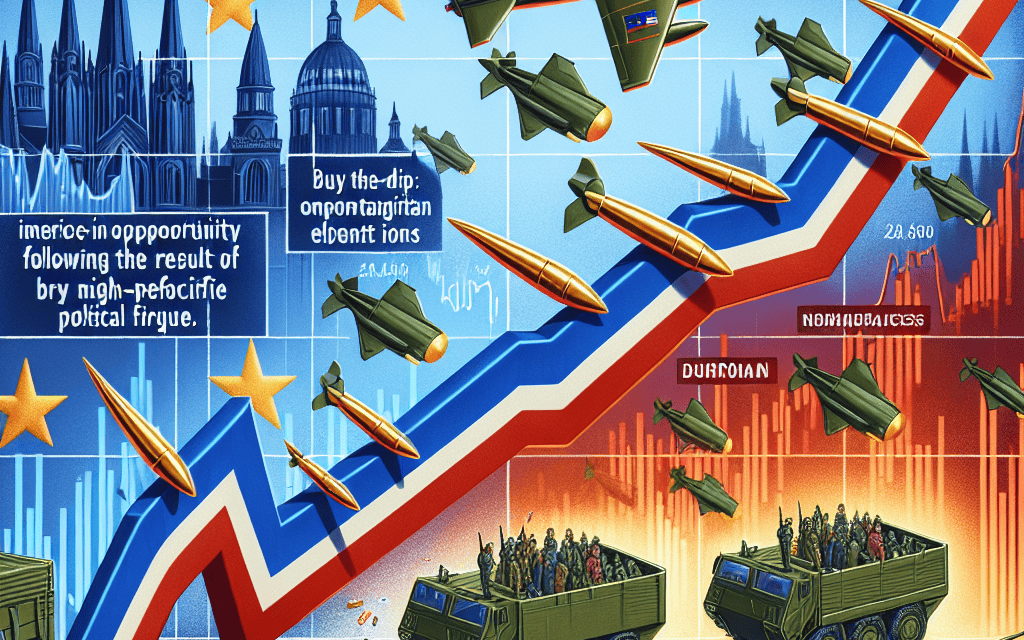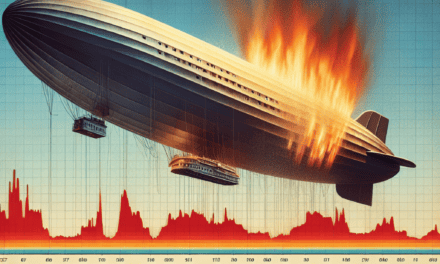“Capitalize on Security: European Defense Stocks Poised for Growth in a Trump Triumph.”
Introduction
European defense stocks present a compelling ‘buy-the-dip’ opportunity in the wake of a potential Trump victory. Historically, Trump’s presidency was marked by increased defense spending and a push for NATO allies to bolster their military budgets, which could lead to heightened demand for European defense products and services. As geopolitical tensions persist and nations prioritize security, European defense companies are well-positioned to benefit from renewed focus on military capabilities. Investors may find value in these stocks, anticipating that a Trump victory could catalyze further growth and investment in the defense sector across Europe.
Impact Of Trump Victory On European Defense Stocks
The prospect of a Trump victory in the upcoming U.S. presidential election has sparked considerable debate among investors, particularly concerning its potential impact on European defense stocks. Historically, defense stocks have been sensitive to geopolitical shifts and changes in government policies, and a Trump administration could bring about significant implications for the defense sector in Europe. As investors evaluate the potential outcomes, the notion of a “buy-the-dip” opportunity emerges, suggesting that any initial market volatility could present a strategic entry point for long-term gains.
To understand the potential impact of a Trump victory on European defense stocks, it is essential to consider the broader geopolitical context. During his previous tenure, President Trump emphasized a strong national defense and encouraged NATO allies to increase their defense spending. This policy stance led to heightened defense budgets across Europe, as countries sought to meet the NATO guideline of spending 2% of their GDP on defense. Consequently, European defense companies experienced a surge in demand for their products and services, bolstering their financial performance.
In the event of a Trump victory, it is plausible that similar policies could be reinstated, potentially leading to increased defense spending in Europe once again. This scenario would likely benefit European defense companies, as they would be well-positioned to capitalize on the renewed focus on military capabilities. Moreover, Trump’s approach to foreign policy, characterized by a preference for bilateral agreements and a more transactional view of alliances, could further incentivize European nations to bolster their defense capabilities independently, thereby driving demand for European defense products.
However, it is important to acknowledge the potential for short-term market volatility in the wake of a Trump victory. Investors may initially react with uncertainty, leading to fluctuations in stock prices. This volatility could be exacerbated by concerns over potential trade tensions between the U.S. and Europe, as well as broader geopolitical uncertainties. Nevertheless, for astute investors, such market dips could present a valuable opportunity to acquire shares in fundamentally strong European defense companies at attractive valuations.
Furthermore, the long-term outlook for European defense stocks remains promising, irrespective of the immediate market reaction to a Trump victory. The global security landscape continues to evolve, with emerging threats such as cyber warfare and geopolitical tensions in regions like Eastern Europe and the Middle East. These factors underscore the ongoing need for robust defense capabilities, ensuring sustained demand for defense products and services.
In addition, European defense companies have been increasingly focusing on innovation and technological advancements, positioning themselves as leaders in areas such as cybersecurity, unmanned systems, and advanced weaponry. This strategic emphasis on cutting-edge technologies not only enhances their competitive edge but also aligns with the evolving defense needs of European nations.
In conclusion, while a Trump victory may initially introduce some market volatility, the underlying fundamentals of European defense stocks suggest a resilient and potentially lucrative investment opportunity. By adopting a “buy-the-dip” strategy, investors can capitalize on short-term market fluctuations while positioning themselves for long-term gains. As the geopolitical landscape continues to shift, European defense companies are poised to play a crucial role in shaping the future of global security, making them an attractive consideration for discerning investors.
Analyzing The ‘Buy-the-Dip’ Strategy For Defense Investors
In the realm of investment strategies, the “buy-the-dip” approach has long been a favored tactic among savvy investors, particularly in sectors characterized by cyclical volatility. European defense stocks, in particular, present a compelling case for this strategy, especially in the context of a potential Trump victory in the United States. The geopolitical landscape, shaped by the policies and rhetoric of the Trump administration, has historically influenced defense spending and, by extension, defense stocks. Therefore, understanding the dynamics at play is crucial for investors considering this approach.
To begin with, the defense sector is inherently linked to geopolitical stability and government defense budgets. During Trump’s previous tenure, there was a marked increase in defense spending, driven by a focus on strengthening military capabilities and addressing perceived global threats. This policy direction had a ripple effect across the Atlantic, prompting European nations to reassess their defense strategies and budgets. Consequently, European defense companies experienced a surge in demand for their products and services, leading to an uptick in stock valuations.
However, the market is not without its fluctuations. Political uncertainties, such as elections, can lead to temporary dips in stock prices as investors react to potential changes in policy. A Trump victory could initially unsettle markets due to anticipated shifts in international relations and trade policies. Yet, for those employing a “buy-the-dip” strategy, such volatility presents an opportunity. By purchasing stocks during these temporary downturns, investors can potentially capitalize on the subsequent recovery and growth driven by increased defense spending.
Moreover, the European defense sector is poised for long-term growth, irrespective of short-term political changes. The ongoing modernization of military infrastructure, coupled with the need for advanced technology to address emerging threats, ensures a steady demand for defense products and services. European companies, known for their innovation and technological prowess, are well-positioned to meet this demand. Thus, even in the face of political uncertainties, the fundamental growth prospects of these companies remain robust.
In addition to geopolitical factors, economic considerations also play a role in the attractiveness of European defense stocks. The sector’s resilience during economic downturns, due to the essential nature of defense spending, provides a degree of stability that is appealing to investors. Furthermore, the diversification of revenue streams, with many European defense companies having significant international operations, mitigates risks associated with regional economic fluctuations.
Transitioning from the macroeconomic perspective to individual investor considerations, it is essential to conduct thorough due diligence before engaging in a “buy-the-dip” strategy. Evaluating the financial health, competitive positioning, and growth prospects of specific companies is crucial. Additionally, understanding the broader market trends and potential policy changes can provide valuable insights into the timing and potential success of such investments.
In conclusion, while a Trump victory may introduce short-term volatility in European defense stocks, the underlying growth drivers and strategic importance of the sector present a compelling case for the “buy-the-dip” strategy. By carefully analyzing market conditions and individual company performance, investors can potentially benefit from the opportunities presented by temporary market fluctuations, positioning themselves for long-term gains in a sector that remains vital to global security and stability.
European Defense Market Trends Post-Trump Election
The European defense market has long been a focal point for investors seeking stability and growth, particularly in times of geopolitical uncertainty. With the election of Donald Trump, a figure known for his unpredictable foreign policy stances, the dynamics of this market have shifted, presenting both challenges and opportunities. As investors navigate this new landscape, the concept of “buying the dip” in European defense stocks has emerged as a potentially lucrative strategy.
To understand the implications of a Trump victory on European defense stocks, it is essential to consider the broader geopolitical context. Trump’s presidency has been characterized by a strong emphasis on national security and defense spending, both domestically and among NATO allies. His calls for increased defense budgets among European nations have resonated, leading to a gradual uptick in military expenditures across the continent. This trend is likely to continue, as European countries seek to bolster their defense capabilities in response to both external threats and pressure from the United States.
In this environment, European defense companies stand to benefit significantly. Firms specializing in advanced military technologies, cybersecurity, and aerospace are particularly well-positioned to capitalize on increased defense spending. As governments allocate more resources to modernizing their armed forces, these companies are likely to see a surge in demand for their products and services. Consequently, the current dip in stock prices, driven by market volatility and investor uncertainty, may present a unique buying opportunity for those with a long-term perspective.
Moreover, the strategic importance of Europe in global defense cannot be overstated. The continent’s proximity to volatile regions, such as the Middle East and Eastern Europe, underscores the necessity for robust defense mechanisms. As tensions persist in these areas, European nations are compelled to enhance their military readiness, further driving demand for defense solutions. This geopolitical reality, coupled with Trump’s influence, creates a fertile ground for growth in the European defense sector.
Transitioning from the geopolitical to the economic perspective, it is crucial to consider the financial health and innovation capacity of European defense companies. Many of these firms boast strong balance sheets and a track record of technological advancements, positioning them as leaders in the global defense industry. Their ability to adapt to changing defense needs and invest in cutting-edge technologies ensures their competitiveness in an increasingly complex market. As such, investors seeking to capitalize on the anticipated growth in defense spending may find European defense stocks to be an attractive addition to their portfolios.
Furthermore, the potential for collaboration between European and American defense companies should not be overlooked. Joint ventures and partnerships can lead to the development of innovative defense solutions, benefiting both parties and enhancing their market positions. Trump’s presidency, with its focus on strengthening transatlantic ties, may facilitate such collaborations, providing an additional catalyst for growth in the European defense sector.
In conclusion, while the election of Donald Trump introduces a degree of uncertainty into the European defense market, it also presents a compelling “buy-the-dip” opportunity for astute investors. By recognizing the geopolitical and economic factors at play, and understanding the strategic importance of defense in Europe, investors can position themselves to benefit from the anticipated growth in this sector. As European nations continue to prioritize defense spending, the potential for long-term gains in defense stocks remains significant, making this an opportune moment to consider investment in this dynamic market.
Key European Defense Companies To Watch
In the wake of geopolitical uncertainties and shifting global alliances, European defense stocks have emerged as a focal point for investors seeking to capitalize on potential market fluctuations. The prospect of a Trump victory in the upcoming U.S. elections has added a layer of complexity to the defense sector, particularly in Europe, where companies are poised to benefit from increased defense spending and strategic realignments. As investors consider the implications of such a political outcome, several key European defense companies warrant close attention, offering potential ‘buy-the-dip’ opportunities.
Foremost among these is BAE Systems, a British multinational defense, security, and aerospace company. BAE Systems has consistently demonstrated resilience in the face of market volatility, underpinned by its robust order book and diversified portfolio. The company’s strong presence in the United States, coupled with its strategic partnerships, positions it well to benefit from any shifts in U.S. defense policy under a Trump administration. Moreover, BAE Systems’ ongoing investments in technology and innovation ensure its competitiveness in an evolving defense landscape.
Similarly, Airbus, a European aerospace giant, stands to gain from increased defense budgets across the continent. While primarily known for its commercial aircraft, Airbus has a significant defense and space division that contributes to its overall revenue. The company’s involvement in major European defense projects, such as the Eurofighter Typhoon and the A400M military transport aircraft, underscores its strategic importance. A Trump victory could potentially lead to a recalibration of NATO commitments, prompting European nations to bolster their defense capabilities, thereby benefiting companies like Airbus.
Transitioning to the naval sector, Thales Group, a French multinational company, is another key player to watch. Thales is renowned for its expertise in defense electronics and systems integration, providing critical solutions for naval, land, and air forces. The company’s strong ties with European governments and its involvement in cutting-edge projects, such as the development of next-generation radar systems, position it favorably in a landscape where technological superiority is paramount. As European nations reassess their defense strategies, Thales is well-placed to capture new opportunities.
Furthermore, Leonardo S.p.A., an Italian multinational company specializing in aerospace, defense, and security, offers a compelling investment case. Leonardo’s diverse product range, which includes helicopters, aircraft, and defense electronics, provides a buffer against market fluctuations. The company’s strategic focus on innovation and international expansion has bolstered its competitive edge. In the context of a Trump victory, Leonardo could benefit from increased collaboration between European and U.S. defense sectors, enhancing its growth prospects.
In addition to these individual companies, the broader European defense sector is likely to experience heightened investor interest. The potential for increased defense spending, driven by geopolitical tensions and the need for enhanced security measures, creates a favorable environment for growth. Investors should remain vigilant, however, as the sector is not without risks. Political uncertainties, budgetary constraints, and technological disruptions could pose challenges. Nevertheless, the strategic importance of defense in maintaining national security and stability cannot be overstated.
In conclusion, European defense stocks present a promising ‘buy-the-dip’ opportunity in the event of a Trump victory. Companies such as BAE Systems, Airbus, Thales Group, and Leonardo S.p.A. are well-positioned to capitalize on potential shifts in defense policy and spending. As investors navigate this complex landscape, a focus on innovation, strategic partnerships, and market diversification will be key to identifying opportunities within the European defense sector.
Geopolitical Implications Of A Trump Presidency On Europe
The prospect of a Trump victory in the upcoming U.S. presidential election has reignited discussions about the geopolitical landscape and its potential implications for Europe. One area of particular interest is the defense sector, where European defense stocks could present a ‘buy-the-dip’ opportunity for investors. As the world braces for possible shifts in international relations, understanding the dynamics at play is crucial for making informed investment decisions.
Under a Trump presidency, the emphasis on national sovereignty and a transactional approach to international alliances could lead to significant changes in NATO dynamics. Trump’s previous tenure saw calls for European nations to increase their defense spending, a demand that resonated with varying degrees of acceptance across the continent. Should Trump return to office, it is likely that these calls will be renewed, potentially leading to increased defense budgets in Europe. This scenario could create a favorable environment for European defense companies, as governments seek to bolster their military capabilities in response to external pressures.
Moreover, the geopolitical tensions that have characterized recent years, such as those involving Russia and China, are unlikely to dissipate. In fact, a Trump presidency might exacerbate these tensions, as his administration could adopt a more confrontational stance. This possibility underscores the importance of a robust defense posture for European nations, further supporting the case for increased defense spending. Consequently, European defense stocks could benefit from heightened demand for military equipment and technology, as countries strive to enhance their security infrastructure.
In addition to the direct impact on defense spending, a Trump victory could also influence the broader economic environment in ways that affect the defense sector. For instance, potential shifts in trade policies and international agreements might lead to economic uncertainties, prompting governments to prioritize defense as a means of safeguarding national interests. This prioritization could translate into lucrative contracts for defense companies, thereby boosting their financial performance and attractiveness to investors.
Furthermore, the potential for a Trump presidency to alter the transatlantic relationship cannot be overlooked. While the U.S. has traditionally been a key ally for Europe, Trump’s approach to foreign policy may lead to a reevaluation of this partnership. European nations might seek to assert greater autonomy in their defense strategies, reducing reliance on U.S. support. This shift could drive investment in domestic defense industries, providing a further catalyst for growth in European defense stocks.
It is also important to consider the role of technological advancements in shaping the future of defense. As nations invest in cutting-edge technologies such as artificial intelligence, cybersecurity, and unmanned systems, European defense companies that are at the forefront of innovation stand to gain a competitive edge. A Trump presidency, with its focus on strengthening national security, could accelerate the adoption of these technologies, creating additional opportunities for growth in the sector.
In conclusion, while the geopolitical implications of a Trump presidency on Europe are complex and multifaceted, the potential impact on the defense sector is clear. Increased defense spending, driven by heightened security concerns and a desire for greater autonomy, could create a favorable environment for European defense stocks. For investors seeking to capitalize on these developments, a ‘buy-the-dip’ strategy may prove advantageous, as the sector positions itself for growth in an uncertain world. As always, careful analysis and consideration of the broader geopolitical context are essential for making informed investment decisions.
Investment Risks And Opportunities In European Defense
In the realm of global finance, the defense sector often stands as a bastion of stability and growth, particularly during times of geopolitical uncertainty. European defense stocks, in particular, have garnered significant attention from investors seeking to capitalize on the continent’s robust defense industry. The potential re-election of Donald Trump as President of the United States could present a unique ‘buy-the-dip’ opportunity for these stocks, as his administration’s policies may influence defense spending and international relations in ways that could benefit European defense companies.
To understand the potential impact of a Trump victory on European defense stocks, it is essential to consider the broader geopolitical landscape. During his previous tenure, Trump emphasized a strong national defense and encouraged NATO allies to increase their defense spending. This push for greater financial contributions from European nations could lead to increased budgets for defense, thereby benefiting European defense contractors. As countries strive to meet NATO’s defense spending target of 2% of GDP, European defense firms may see a surge in demand for their products and services.
Moreover, Trump’s foreign policy approach, characterized by unpredictability and a focus on American interests, could lead to heightened tensions in various regions. This uncertainty often prompts nations to bolster their defense capabilities, further driving demand for military equipment and technology. European defense companies, known for their advanced technology and innovation, are well-positioned to meet this demand, potentially leading to increased revenues and stock valuations.
However, investing in European defense stocks is not without its risks. The defense industry is heavily influenced by government policies and international relations, which can be volatile and unpredictable. A shift in political dynamics, such as a change in leadership or policy direction, could impact defense budgets and procurement decisions. Additionally, the defense sector is subject to regulatory scrutiny and export controls, which can affect the ability of companies to secure international contracts.
Despite these risks, the potential rewards of investing in European defense stocks during a Trump presidency could be substantial. Investors may find opportunities in companies that are leaders in their field, with strong order books and a track record of innovation. Furthermore, the European Union’s efforts to enhance its defense capabilities through initiatives such as the European Defence Fund could provide additional support to the sector, fostering growth and collaboration among member states.
In conclusion, while the prospect of a Trump victory introduces a degree of uncertainty, it also presents a potential ‘buy-the-dip’ opportunity for European defense stocks. By carefully assessing the geopolitical landscape and the specific strengths of individual companies, investors can position themselves to capitalize on the potential growth in this sector. As always, it is crucial for investors to conduct thorough research and consider the inherent risks before making investment decisions. With a strategic approach, the European defense sector could offer significant opportunities for those willing to navigate its complexities.
Long-term Growth Prospects For European Defense Stocks
In the realm of global finance, the defense sector has long been a cornerstone of economic stability and growth, particularly in regions with significant geopolitical influence. European defense stocks, in particular, have garnered attention from investors seeking long-term growth opportunities. The potential re-election of Donald Trump as President of the United States could serve as a catalyst for these stocks, presenting a ‘buy-the-dip’ opportunity for astute investors. As we delve into the intricacies of this potential scenario, it is essential to consider the broader implications of a Trump victory on European defense markets.
Historically, Trump’s presidency was marked by a strong emphasis on national security and defense spending. His administration’s policies often encouraged NATO allies to increase their defense budgets, a move that directly benefited European defense companies. Should Trump return to office, it is reasonable to anticipate a resurgence of similar policies, which could lead to increased defense spending across Europe. This, in turn, would likely bolster the financial performance of European defense firms, making them attractive prospects for long-term investment.
Moreover, the geopolitical landscape has evolved significantly since Trump’s previous tenure. The ongoing tensions between NATO and Russia, exacerbated by the conflict in Ukraine, have underscored the importance of robust defense capabilities. European nations are increasingly prioritizing their defense strategies, leading to a surge in demand for advanced military technology and equipment. European defense companies, with their cutting-edge innovations and strategic partnerships, are well-positioned to capitalize on this demand. Consequently, a Trump victory could further amplify these trends, providing a fertile ground for growth in the sector.
In addition to geopolitical factors, the technological advancements within the defense industry cannot be overlooked. European defense firms are at the forefront of developing next-generation technologies, such as artificial intelligence, cyber defense, and unmanned systems. These innovations not only enhance military capabilities but also open new revenue streams for companies. As nations strive to modernize their defense arsenals, the demand for such technologies is expected to rise, offering European defense stocks a promising trajectory for long-term growth.
Furthermore, the economic implications of a Trump victory extend beyond immediate policy changes. The potential for increased defense spending could stimulate job creation and economic activity within the sector, contributing to a more robust European economy. This economic vitality would likely have a positive ripple effect on the stock market, enhancing investor confidence and driving up the value of defense stocks.
While the prospect of a Trump victory presents a compelling case for investing in European defense stocks, it is crucial for investors to remain vigilant and consider potential risks. Political landscapes are inherently unpredictable, and shifts in policy or international relations could impact market dynamics. Therefore, a diversified investment strategy, coupled with a keen awareness of global events, is advisable for those seeking to capitalize on this opportunity.
In conclusion, the potential re-election of Donald Trump as President of the United States could serve as a significant catalyst for European defense stocks. The combination of increased defense spending, technological advancements, and geopolitical tensions creates a favorable environment for long-term growth in the sector. For investors with a keen eye on the future, this ‘buy-the-dip’ opportunity may well prove to be a strategic move in navigating the complexities of the global defense market.
Q&A
1. **Question:** How might a Trump victory impact European defense stocks?
**Answer:** A Trump victory could lead to increased defense spending and pressure on European NATO members to boost their military budgets, potentially benefiting European defense stocks.
2. **Question:** Which European defense companies could be considered for investment in this scenario?
**Answer:** Companies like BAE Systems, Airbus, Leonardo, and Thales might be considered due to their significant roles in the defense sector.
3. **Question:** What are the potential risks associated with investing in European defense stocks after a Trump victory?
**Answer:** Risks include geopolitical tensions, changes in defense policies, and potential trade disputes that could affect defense contracts and supply chains.
4. **Question:** How does the European defense sector compare to the U.S. defense sector in terms of market opportunities?
**Answer:** The European defense sector may offer diverse opportunities due to varying national defense priorities and potential increases in defense budgets across multiple countries.
5. **Question:** What role does NATO play in the potential growth of European defense stocks?
**Answer:** NATO’s emphasis on member countries meeting defense spending targets could drive increased investment in defense capabilities, benefiting European defense companies.
6. **Question:** How might currency fluctuations impact European defense stocks in the event of a Trump victory?
**Answer:** Currency fluctuations could affect the profitability of European defense companies, especially those with significant exports or contracts priced in U.S. dollars.
7. **Question:** What is a ‘buy-the-dip’ strategy, and how could it apply to European defense stocks in this context?
**Answer:** A ‘buy-the-dip’ strategy involves purchasing stocks after a price decline, anticipating a rebound. Investors might apply this to European defense stocks if they believe a Trump victory will lead to increased defense spending and stock recovery.
Conclusion
A Trump victory could potentially lead to increased defense spending and a stronger emphasis on NATO commitments, which may benefit European defense stocks. The prospect of heightened geopolitical tensions and a focus on military readiness could drive demand for defense products and services. Consequently, any dip in European defense stocks might present a buying opportunity for investors anticipating growth in the sector due to these factors. However, investors should also consider the broader market conditions and geopolitical landscape before making investment decisions.





